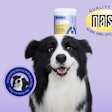
Two scientific studies presented at Petfood Forum 2024 explored how dogs and cats react differently to the same postbiotic additions to their food. As cats have grown in popularity worldwide, the importance of differentiating their nutritional needs from dogs’ has likewise increased. Ultimately, cats are not small dogs, Mark Franklin Ph.D., global additives technical lead with Cargill, said during his presentation at the event in Kansas City, Missouri. Yet, even trained scientists may be tempted to extrapolate data from one species to another.
“We need to conduct species-specific research due to the differences and dangers of extrapolation,” he said. “We’ve all been guilty in the industry of thinking that small adult dogs could be compared to cats... Sometimes it works, but often it doesn’t.”
The first study looked at a postbiotic, Saccharomyces cerevisiae fermentation product (SCFP), on gut health outcomes in healthy adult cats. Postbiotics are the waste left behind after digestion by microbes. However, that waste benefits the health of other species. Fermented human foods like kefir and kimchi provide postbiotics.
The experiment included 63 healthy adult cats over a 42-day test period with a 21-day acclimation period. The researchers tested three levels of postbiotics: 0 (control), 150, and 300 mg per kg body weight inclusion level. All cats were on the same diet: a premium, chicken-based cat food with 30% crude protein and 16% crude fat
The results of their study revealed similarities and differences among cats’ and dogs’ responses to the postbiotic in previous research.
Similarities
• Palatability
• White blood cell response
• Microbiome shifts
Differences
• Inclusion amounts: 150 mg/kg BW versus 100
mg/kg BW
• Immune parameters: IgA
• Microbiome make-up
• Fecal butyrate recovery
• Difference in GI transit times
“From this, we see the necessity of species-specific research to avoid extrapolation errors,” he said.
Postbiotic research on cat dermatitis
Postbiotics affect the digestive systems of dogs and cats differently. Postbiotics also cause different responses on the animals' outsides. In her portion of the Petfood Forum presentation, Holly H. Ganz Ph.D., chief science officer for AnimalBiome discussed a study that tested different doses of postbiotics and placebo controls to determine optimal dosages.
“We found that cats responded better to the 2x dosage for decreasing signs of atopic dermatitis,” she said. “Dogs showed a strong placebo effect, suggesting future studies may benefit from veterinary assessments and targeted time periods for analysis.”
In conclusion, there are stronger benefits for cats regarding atopic dermatitis, emphasizing the need for species-specific research, she said. Future steps include conducting studies with final product formulations and independent verification.
















